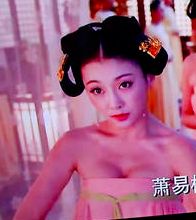Annie Lundgren Writes: TV viewers in China are using social media to criticize the government’s censorship of cleavage in the new show, “The Empress of China.” After a brief, four-day suspension of the original broadcast, an edited version of the show returned with close-up shots – but only above the bustline.
The period drama, set during the Tang dynasty, puts a sexy spin on the story of China’s only female emperor, Empress Wu. The show features beautiful women wearing bodices so tight-fitting their chests bulge. Indeed, high fashion from the Tang dynasty (625-705 AD) often boasted low-cut and high-waisted dresses that accentuated breasts. Even so, the era is regarded by historians as a cultural renaissance in China, when liberal ideas flourished and women experienced a heightened social status.
Admittedly, the liberal use of hot-pink eyeshadow and nail polish on the bosomy TV actresses today is an obvious historical inaccuracy. Perhaps the costuming is over-embellished, too. But the government reaction instigated an online backlash from some viewers who consider such censorship a threat to freedom of expression. After all, Chinese TV has a very long way to go to measure up to the West, where cleavage is regularly visible and often celebrated.
Other Chinese deemed the show inappropriate for its young viewership. In fact, public opinion of stringent media controls is divided among a population that has been governed by Communist rule for more than sixty years. In particular, the gap between the Internet generation and their parents has periodically sparked debate on censorship.
With China’s emergence into the international spotlight, the country’s entertainment industry has increasingly been influenced by gender norms and stereotypes from the West. This is why criticism of China’s strict censorship laws suggests an emergence of cross-cultural values, particularly on sexuality, within mainstream society.
Censorship has been a contentious issue in China. But the Communist regime notoriously mandates strict regulations on the media. The representation of sexuality is no exception. For the authoritarian government, censorship of the media and Internet is crucial to shaping the morality of its people, which Beijing argues improves national security. Just recently – in another example of an official pushback against overt sexuality in the public arena – a Shanghai Auto Show was prohibited from employing sexy racing models. The official reason given was to put additional focus on the cars. But the large crowds at auto shows throughout Asia suggest that with cars, as with TV shows, usually sex sells.
Viewers’ complaints of the newly edited “Empress of China” surely reflect the nettlesome effects of China’s accelerated modernization on traditional Confucian values emphasizing public modesty.

